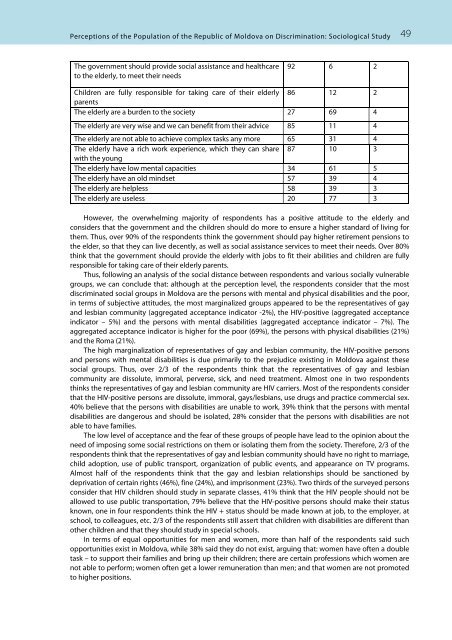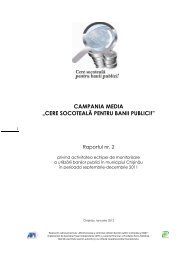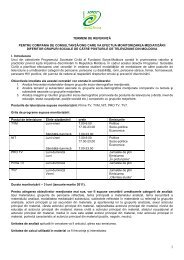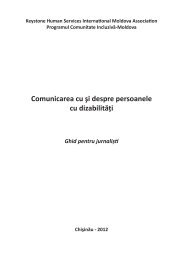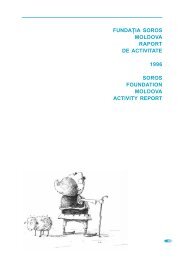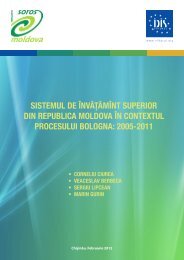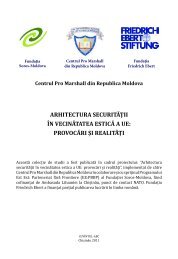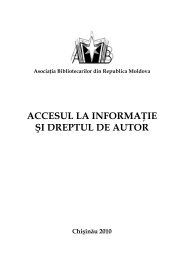Perceptions of the Population of the Republic of Moldova - Soros ...
Perceptions of the Population of the Republic of Moldova - Soros ...
Perceptions of the Population of the Republic of Moldova - Soros ...
- No tags were found...
Create successful ePaper yourself
Turn your PDF publications into a flip-book with our unique Google optimized e-Paper software.
<strong>Perceptions</strong> <strong>of</strong> <strong>the</strong> <strong>Population</strong> <strong>of</strong> <strong>the</strong> <strong>Republic</strong> <strong>of</strong> <strong>Moldova</strong> on Discrimination: Sociological Study 49The government should provide social assistance and healthcareto <strong>the</strong> elderly, to meet <strong>the</strong>ir needs92 6 2Children are fully responsible for taking care <strong>of</strong> <strong>the</strong>ir elderly 86 12 2parentsThe elderly are a burden to <strong>the</strong> society 27 69 4The elderly are very wise and we can benefit from <strong>the</strong>ir advice 85 11 4The elderly are not able to achieve complex tasks any more 65 31 4The elderly have a rich work experience, which <strong>the</strong>y can share 87 10 3with <strong>the</strong> youngThe elderly have low mental capacities 34 61 5The elderly have an old mindset 57 39 4The elderly are helpless 58 39 3The elderly are useless 20 77 3However, <strong>the</strong> overwhelming majority <strong>of</strong> respondents has a positive attitude to <strong>the</strong> elderly andconsiders that <strong>the</strong> government and <strong>the</strong> children should do more to ensure a higher standard <strong>of</strong> living for<strong>the</strong>m. Thus, over 90% <strong>of</strong> <strong>the</strong> respondents think <strong>the</strong> government should pay higher retirement pensions to<strong>the</strong> elder, so that <strong>the</strong>y can live decently, as well as social assistance services to meet <strong>the</strong>ir needs. Over 80%think that <strong>the</strong> government should provide <strong>the</strong> elderly with jobs to fit <strong>the</strong>ir abilities and children are fullyresponsible for taking care <strong>of</strong> <strong>the</strong>ir elderly parents.Thus, following an analysis <strong>of</strong> <strong>the</strong> social distance between respondents and various socially vulnerablegroups, we can conclude that: although at <strong>the</strong> perception level, <strong>the</strong> respondents consider that <strong>the</strong> mostdiscriminated social groups in <strong>Moldova</strong> are <strong>the</strong> persons with mental and physical disabilities and <strong>the</strong> poor,in terms <strong>of</strong> subjective attitudes, <strong>the</strong> most marginalized groups appeared to be <strong>the</strong> representatives <strong>of</strong> gayand lesbian community (aggregated acceptance indicator -2%), <strong>the</strong> HIV-positive (aggregated acceptanceindicator – 5%) and <strong>the</strong> persons with mental disabilities (aggregated acceptance indicator – 7%). Theaggregated acceptance indicator is higher for <strong>the</strong> poor (69%), <strong>the</strong> persons with physical disabilities (21%)and <strong>the</strong> Roma (21%).The high marginalization <strong>of</strong> representatives <strong>of</strong> gay and lesbian community, <strong>the</strong> HIV-positive personsand persons with mental disabilities is due primarily to <strong>the</strong> prejudice existing in <strong>Moldova</strong> against <strong>the</strong>sesocial groups. Thus, over 2/3 <strong>of</strong> <strong>the</strong> respondents think that <strong>the</strong> representatives <strong>of</strong> gay and lesbiancommunity are dissolute, immoral, perverse, sick, and need treatment. Almost one in two respondentsthinks <strong>the</strong> representatives <strong>of</strong> gay and lesbian community are HIV carriers. Most <strong>of</strong> <strong>the</strong> respondents considerthat <strong>the</strong> HIV-positive persons are dissolute, immoral, gays/lesbians, use drugs and practice commercial sex.40% believe that <strong>the</strong> persons with disabilities are unable to work, 39% think that <strong>the</strong> persons with mentaldisabilities are dangerous and should be isolated, 28% consider that <strong>the</strong> persons with disabilities are notable to have families.The low level <strong>of</strong> acceptance and <strong>the</strong> fear <strong>of</strong> <strong>the</strong>se groups <strong>of</strong> people have lead to <strong>the</strong> opinion about <strong>the</strong>need <strong>of</strong> imposing some social restrictions on <strong>the</strong>m or isolating <strong>the</strong>m from <strong>the</strong> society. Therefore, 2/3 <strong>of</strong> <strong>the</strong>respondents think that <strong>the</strong> representatives <strong>of</strong> gay and lesbian community should have no right to marriage,child adoption, use <strong>of</strong> public transport, organization <strong>of</strong> public events, and appearance on TV programs.Almost half <strong>of</strong> <strong>the</strong> respondents think that <strong>the</strong> gay and lesbian relationships should be sanctioned bydeprivation <strong>of</strong> certain rights (46%), fine (24%), and imprisonment (23%). Two thirds <strong>of</strong> <strong>the</strong> surveyed personsconsider that HIV children should study in separate classes, 41% think that <strong>the</strong> HIV people should not beallowed to use public transportation, 79% believe that <strong>the</strong> HIV-positive persons should make <strong>the</strong>ir statusknown, one in four respondents think <strong>the</strong> HIV + status should be made known at job, to <strong>the</strong> employer, atschool, to colleagues, etc. 2/3 <strong>of</strong> <strong>the</strong> respondents still assert that children with disabilities are different thano<strong>the</strong>r children and that <strong>the</strong>y should study in special schools.In terms <strong>of</strong> equal opportunities for men and women, more than half <strong>of</strong> <strong>the</strong> respondents said suchopportunities exist in <strong>Moldova</strong>, while 38% said <strong>the</strong>y do not exist, arguing that: women have <strong>of</strong>ten a doubletask – to support <strong>the</strong>ir families and bring up <strong>the</strong>ir children; <strong>the</strong>re are certain pr<strong>of</strong>essions which women arenot able to perform; women <strong>of</strong>ten get a lower remuneration than men; and that women are not promotedto higher positions.


